Italian neo-avant-garde in Soviet philology: An approach to the problem
The article studies the reception of Italian neo-avant-garde (Group 63) in Soviet philology. Italian neo-avant-garde was an experimental movement born in mid-1950s around Luciano Anceschi's literary magazine Il Verri (since 1956). In 1963 neo-avant-garde poets, writers and critics formed a literary group called Group 63. The group dissolved in 1969 as a result of ideological disputes regarding the political protests of 1968-1969, thus marking the official end of Italian neo-avant-garde. The article analyzes Soviet academic monographs dealing with Italian neo-avant-garde (Neo-Avant-Garde Currents in Foreign Literature of the 1950s-1960s, Moscow, Khudozhestvennaya Literatura, 1972; The Ways of the Novel, Moscow, Progress, 1975; Z.M. Potapova, Italian Novel Today, Moscow, Nauka, 1977) and articles in the Voprosy Literatury journal published by the Union of Soviet Writers and the Maxim Gorky Institute of World Literature. The study aims to determine specific features of Soviet academic discourse about neo-avant-garde and to study the evolution of that discourse in time, in relation to the historical and cultural context. In order to achieve the aim, I analyze how the Soviet reception of neo-avant-garde was shaped, study the opinions on Western neo-avant-garde and other experimental movements expressed by the main figures of Soviet politics and culture, describe how experimental arts and literature were fiercely attacked by the official press, and determine the role of those critical and even derogatory commentaries in Soviet culture of the Cold War period, with its political and ideological conflicts. To better understand the features of Soviet academic dis-cource on Italian neo-avant-garde, I: (1) compare the mentioned monographs and academic articles with pieces of literary criticism published in non-academic literary magazines, such as Novy Mir and Inostrannaya Literatura; (2) make a comparison between the two genres of Soviet academic discource on Italian neo-avant-garde (parts of monographs, on one hand, and articles in Voprosy Literatury, on the other hand). As a result of this comparative analysis, I: (1) point out such specific features of Soviet academic writings on Italian neo-avant-garde as terminological vagueness (such philological terms as "avant-garde", "modernism", "decadence", etc. are used as ideological cliches, derogatory terms devoid of exact meaning) and stylistic similarity between academic and journalistic discourse (both types of discourse on neo-avant-garde are almost equally ideologically and emotionally charged); (2) find a number of differences in style and content occurring between the articles in monographs and in Voprosy Literatury, the latter being written in a considerably more moderate and balanced manner, without ideological excesses and aggressive rhetoric. Trying to explain those discrepances, I put forward two hypotheses: (1) Voprosy Literatury, being an academic journal, unlike Novy Mir or Inostrannaya Literatura, endorsed a more moderate and unbiased way of treating even ideologically sensitive subjects, such as literary neo-avant-garde; (2) the second, seemingly paradoxical finding (a considerable stylistic difference between the two genres of academic discourse on neo-avant-garde) may actually be of a temporal, not a genre nature: the mentioned monographs were published in the 1970s, several years after the articles in Voprosy Literatury, but as the process of writing and publishing a book takes much longer than that of an article, those monographs, in comparison to articles, actually reflect an earlier, less "liberal" and more ideologically charged period of the Soviet reception of Italian neo-avant-garde. Still, I note that my conclusions are preliminary ones, and the subject deserves a futher, more profound research. The author declares no conflicts of interests.
Keywords
journalistic discourse, academic discourse, monographs, Inostrannaya Literatura, Novy Mir, Voprosy Literatury, Group 63, reception, Italian neo-avant-gardeAuthors
| Name | Organization | |
| Golubtsova Anastasia V. | Maxim Gorky Institute of World Literature of the Russian Academy of Sciences | ana1294@yandex.ru |
References

Italian neo-avant-garde in Soviet philology: An approach to the problem | Vestnik Tomskogo gosudarstvennogo universiteta. Filologiya – Tomsk State University Journal of Philology. 2024. № 92. DOI: 10.17223/19986645/92/8
